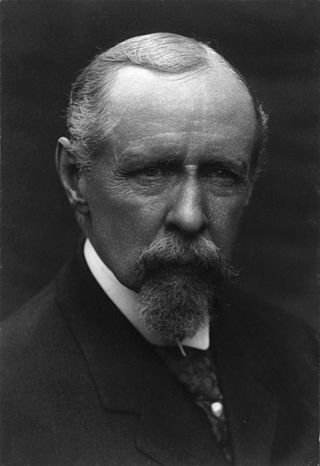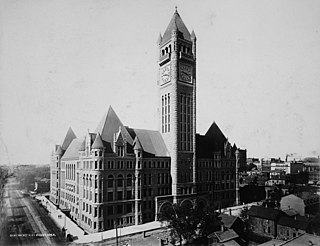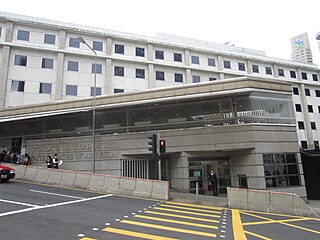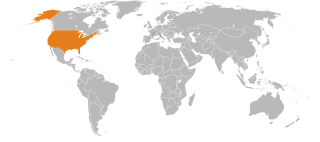
The United States Foreign Service is the primary personnel system used by the diplomatic service of the United States federal government, under the aegis of the United States Department of State. It consists of over 13,000 professionals carrying out the foreign policy of the United States and aiding U.S. citizens abroad. The current director general is Marcia Bernicat.

The Immigration Act of 1924, or Johnson–Reed Act, including the Asian Exclusion Act and National Origins Act, was a United States federal law that prevented immigration from Asia and set quotas on the number of immigrants from Eastern and Southern Europe. It also authorized the creation of the country's first formal border control service, the U.S. Border Patrol, and established a "consular control system" that allowed entry only to those who first obtained a visa from a U.S. consulate abroad.
The Bureau of Consular Affairs (CA) is a bureau of the United States Department of State reporting to the under secretary of state for management. The mission of the Bureau is to administer laws, formulate regulations and implement policies relating to the broad range of consular services and immigration. As of 2021, the bureau is headed by the Assistant Secretary of State for Consular Affairs, Rena Bitter.

A consul is an official representative of the government of one state in the territory of another, normally acting to assist and protect the citizens of the consul's own country, as well as to facilitate trade and friendship between the people of the two countries.

Alvey Augustus Adee was a long-time official with the United States Department of State who served as the acting Secretary of State in 1898 during the Spanish–American War. He was the second of three senior State Department officials—the first being William Hunter and the third Wilbur J. Carr—whose overlapping careers provided continuity and good management in American foreign policy for over a century, from the administration of President Andrew Jackson until that of Franklin D. Roosevelt.

The United States Court for China was a United States district court that had extraterritorial jurisdiction over U.S. citizens in China. It existed from 1906 to 1943 and had jurisdiction in civil and criminal matters, with appeals taken to the U.S. Court of Appeals for the Ninth Circuit in San Francisco.

Minneapolis is the largest city in the state of Minnesota in the United States, and the county seat of Hennepin County.

The Consulate General of the United States, Hong Kong and Macau, represents the United States in Hong Kong and Macau.
The United States Department of State, like other agencies of the U.S. federal government, gives civilian decorations for outstanding service, sacrifice, or heroism. The criteria for the awards are set down in 3 FAM 4820 - Foreign Affairs Manual, 3 FAM - Personnel, section 3 FAM 4800 Department Awards Program.

The Secretary’s Career Achievement Award is an award of the United States Department of State. It is presented to retiring career employees in the Department who, over a period of 25 years or more, of U.S. Government and/or military service, have performed with dedication and distinction.

The Rogers Act of 1924, often referred to as the Foreign Service Act of 1924, is the legislation that merged the United States diplomatic and consular services into the United States Foreign Service. It defined a personnel system under which the United States Secretary of State is authorized to assign and rotate diplomats abroad. It merged the low-paid high prestige diplomatic service with the higher paid, middle class consul service. The act provided a merit-based career path, with guaranteed rotations and better pay.

Monaco and the United States exchanged consular officials soon after the end of the U.S. Civil War. The first consul from Monaco to the US was Louis Borg, who presented his credentials in May 1866.

The Ministry of Foreign Affairs of the Republic of Serbia is the ministry in the government of Serbia which is in the charge of maintaining the consular affairs and foreign relations of Serbia. The current minister is Ivica Dačić, in office since 26 October 2022.

Visitors to Mongolia must obtain a visa unless they come from one of the visa-exempt countries. Nationals of certain countries may obtain a visa on arrival or an e-Visa online, while others must obtain a visa from a Mongolian diplomatic mission.

Leo John Keena was an American football player and diplomat.

Franklin D. Hale was a Vermont politician who served as State Auditor and want on to a career as a diplomat.

The Consulate General of the United States of America Chennai represents the interests of the United States government in Chennai, India and surrounding regions. The consulate reports to the ambassador at the U.S. Embassy in New Delhi. The current Consul General, the 26th, is Judith Ravin, incumbent since September 2020. She was preceded by Robert G. Burgess.

The Consulate General of United States, Guangzhou is one of seven American diplomatic and consular posts in China. It is one of America's earliest diplomatic posts in the Far East. The consulate serves the South China region, covering the provinces of Guangdong, Guangxi, Hainan and Fujian, an area which, according to the latest census in 2020, has a resident population of over 220 million. The consulate general is also the only U.S. mission in Mainland China to process American adoptions and immigrant visas, making it one of the U.S. Department of State’s busiest consular-related posts.

J. Abdo Debbas was an Ottoman Greek who served as American vice-consul at Tarsus in the south of what is now Turkey. In 1870, he presented a Roman marble sarcophagus with garlands to the Metropolitan Museum of Art which was the first item accepted by the museum.

Relations between Czechoslovakia and the United States refer to two periods in Czechoslovakia's history. The first being the establishment of Czechoslovakia after its declaration of independence in 1918 from Austria-Hungary initiated by President Woodrow Wilson as part of his Fourteen Points following World War I. The second period being the communist era from 1948 when relations were strained, until 1992 when Czechoslovakia split forming the independent nations of the Czech Republic and Slovakia as a result of the 1989 Velvet Revolution.


















